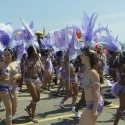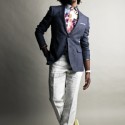Female mentorship programs making a difference in Toronto
WE TEND TO forget the impact female mentors have had in our young lives. Whether it was a teacher, coach, counsellor or family member, we relied upon them to help us navigate the way towards womanhood.
In today’s climate of negative media stereotypes of black women and less positive females as role models, young females are continuing to slip through the cracks of our schools and communities.
Yet there are those who still realize the importance of building relationships with the next generation of women and encouraging them to challenge, question, lead and, most importantly, community build. It’s also important to recognize our own personal potential in taking responsibility and continuing this work with young women.
Two female mentorship programs are changing the ways our young females are forced to redefine themselves and encouraging a community to once again invest in the future.
WHEN BLACK PEARLS Community Services began three years ago, the tight-knit group of educated and ambitious female professionals formed because of their shared concern for the negative media stereotypes and images of black women. At first, the non-profit group fulfilled their mandate through hosting financial seminars, creating a book club, funding youth scholarships and even holding an annual fundraising black-tie gala.
But executive director Renee Rawlins Thomas – a former Miss Barbados who is now a Toronto high-school guidance counsellor and mother of two – saw the need to reach out even further and provide the means to support young females susceptible to the stereotypes that can undermine their confidence and development. So Black Pearls is hatching Project B, a weekly summer initiative that will take place at the YWCA in the Galloway and Kingston area of Scarborough.
Currently a doctorate candidate in education at the University of Toronto, Thomas pinpoints the necessity for female mentorship programs in Toronto. The research she has done references black women and the emotional and mental toll some experience in trying to fit within the dominant white beauty standard. “As a black female within the black community, in seeing these media images, [it’s necessary to know] how to negotiate those images,” she concludes, emphasizing the need to support black females in defining their self-image on their own terms.
Project B will mentor 20 to 30 young females between the ages of 13 to 18. While there will be therapy counselling to aid young females in developing strategies to counter and challenge the pervasive negative stereotypes, there will also be an emphasis on career development in areas like etiquette. “There’s empowerment in knowing how to use a full place-setting, especially when an increasing number of job interviews are elegant dinners in restaurants that require proper conduct,” Thomas explains.
Black Pearls will also be absorbing their highly successful financial seminars into Project B, offering money matters advice that will give young women the chance to develop savings habits earlier. She recognizes how materialism and disposable incomes lead many young women to fall into the trap of applying for their first credit card in university where you eventually “start your life [out of school] with a $2,000 credit limit that is maxed out and you can’t pay it back.” Thomas doesn’t think that many young females are aware of the number of financial resources that are available to them such as scholarships and bursaries.
Black Pearls is also working towards building networks with other female organizations and developing a volunteer database that can support organizations needing that support.
Ultimately, Thomas is excited by Black Pearls’ new development and can’t wait until the summer rolls around. “It’s going to be a fun program – a modern take on Girl Guides with a black feminist twist to it. I think it’s something people will enjoy and participate in.”
IT’S TUESDAY EVENING within the graffiti interiors of The Spot, Jane and Finch’s bustling youth drop-in centre. More than 20 outspoken girls sit around in a circle of chairs, studying scattered photos on the floor: a flattopped Grace Jones and a head-wrapped Erykah Badu; Tyra Banks’ straight bangs contrasted by Alek Wek’s shorn scalp.
Questions fly. Is a shaved head just as beautiful as a long weave? It’s the ensuing heated debate on the differing representations of black beauty that makes Sophia Daley feel like they’re another step closer towards what she aims to do.
As the facilitator and creator of Helping Adolescents Improve their Reflections (H.A.I.R.), it’s her goal to encourage these young women to develop positive, healthy self-images through her unique program.
“Everything comes right back to them [in] making the experience for themselves,” says Daley, also a hair stylist. “How do we work these things through? How do we feel beautiful, and how do we get to a place where we feel good no matter what anyone else says, [so that] nothing can shake us.”
The seasonal seven-week program focuses on hair, image, nutrition and self-care. But Daley mentors participants ranging between 13 and 21 in improving their self-esteem and confidence. Of course, most of them weren’t expecting this – they thought it would be free makeovers and hair product advice.
“They really come in thinking that they’re just learning how to do their hair,” Daley says, laughing at their initial reactions. “Then I get into what the program is about and I say to them: ‘You now need to be able to see if this is something you want to do for yourself’.”
Daley has weathered the divided Jane and Finch neighbourhood lines to create a safe space where participants can unpack these issues and more, like school violence and gangs. Providing healthy home-cooked meals and steady encouragement to speak openly has helped “the young women engage as if they all live in the same backyard,” Daley says.
Samantha Domize, 20, found out about H.A.I.R. through a flyer she picked up on the bus. Even though the program was aimed at females under 17, she called and emailed Daley, begging to get involved. She became one of the first participants, and three cycles later, is training to be a co-facilitator. The Seneca Newham student helps lead workshops and proudly considers her self an “older sister” to the young females.
“I don’t act as an older person; I’m on the same level, but there’s still respect,” she clarifies. “They’re not afraid to hold things back – and that’s really cool.”
It’s break time, and the participants excitedly discuss the upcoming “Hair Pamper Me Day” field trip that will take them to a Scarborough hair salon for a free style. H.A.I.R. is approaching its one-year anniversary, and Daley has been overwhelmed by the community support and parents’ glowing responses.
It has encouraged her to pursue community partnerships and consider expanding the program in locations such as Scarborough and Rexdale.
“I always leave the sessions feeling energetic and so in awe of the young women and myself, and the workshops that happen because of the experience that it creates,” says Daley. “So for me, overall, it just adds to that growth and fuelling of my spirit in continuing this work for young women.”
Originally published in Sway Magazine, Spring 2008







Leave your response!